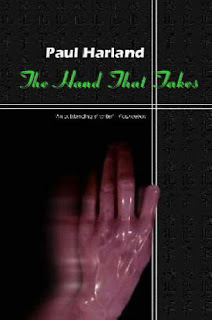The Hand That Takes - Paul Harland
I can’t say I particularly liked The Hand That Takes, but it’s hard to explain why. Maybe I’m used to protagonists who are made of sterner stuff than Rose, but the constant hugging and re-affirmation that he requires on a regular basis becomes rather tiresome. OK, not everyone is Philip Marlowe or Sam Spade, but still, he’s pretty wet for a lead character. It’s very hard to relate to Rose. He is cold - he says this often enough himself - and it’s hard to get anything from his character through his relationships with other people. Shigeki is a cypher who is missing/dead from the start of the book, and from the little you do hear of their relationship, it doesn’t come across as warm, open or loving. When he meets Pittaya, there is lots of the aforementioned hugging, but he also kills him on a regular basis (because of a medical condition, Pittaya is able to die for a few hours and enjoys being killed), so it’s kind of hard to relate to the feelings this must engender. The only other character he is close to is his half-brother Yi-Ming, but even then they don’t seem to know much about each other even though they supposedly write to each other once a week. Yi-Ming knows little about Shigeki, even though Rose has been living with him for 5 years.
The second part of the book goes in another direction. Rose’s work as a DNA geneticist (excuse me if I don’t use the correct scientific terminology) gets him work on a project he has been thinking of for years - a bio-engineering project that will allow the body to be independently self-sustaining, creating its own food to nourish the bearer. The project gets infiltrated and test subjects are found to be producing cocaine and heroin from their bodies. It’s seems like a ludicrous idea and pretty dubious science to me and I didn’t get much further with the book than this. The ideas are far-fetched, barely credible and the whole thing didn’t really cohere. I’m sure it all ties back with Hwa-yun Yeh and Shigeki by the end, but it’s a real struggle to get to there.
I can’t point to any flaws with the writing, but I just failed to connect with the characters; they all seemed pretty cardboard and two-dimensional. Also, for some reason they are always eating. This is really bizarre. I realise we all eat regularly and this is a realistic aspect that is often left out in books, but here it is taken to extremes. While the characters discuss important plot developments, we get constant irrelevant interruptions as they ask for more tea, discuss the flavour of the food etc. Here’s a couple of examples:
“And instead of becoming a terrorist, you became a Taoist.”
“You might put it that way.” Rose eyed Da-fu Lee’s tea service, a matching set in deceptively simple blue china. “Those are very beautiful cups”, he said.
After some minutes of diligent chewing, he said: “ I was wondering…” A piece of cake dropped from his lips and he stuffed it back with a long thin finger. “Wondering who told them about your invention.”
Rose took another bite. “Hmmmf… What do you mean?”
“This skin augmentation thing of yours,” Pittaya said. “Who knew about it?”
“Practically nobody”, Rose said. “You, me, Shigeki, Yi-ming. Why?”
Pittaya put his piece of cake down. “I’d say that is obvious?”
There are literally scores of examples of this and it is very strange indeed. It is not really relevant or interesting and doesn’t particularly tell you anything about the characters. Unless it relates in some way to the plot element of growing food on your own body, otherwise, even the plot is another example of a strange obsession with eating and drinking. (‘The Hand That Takes’? The Hand That Feeds’ more like). Either way, the book just didn’t engage or hold me and I didn’t finish it. Sorry.




Comments
Post a Comment